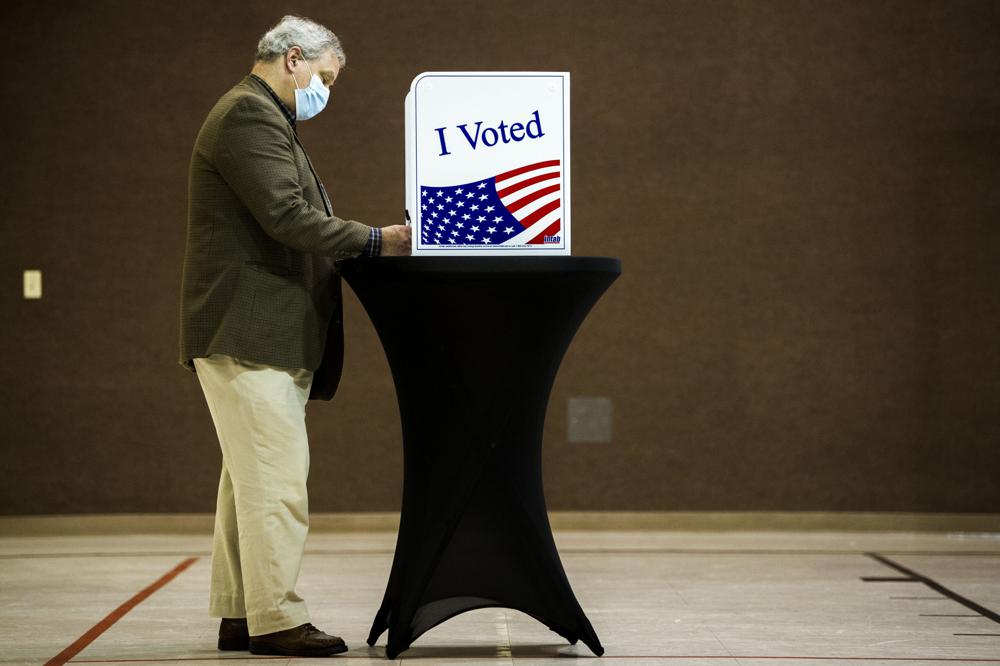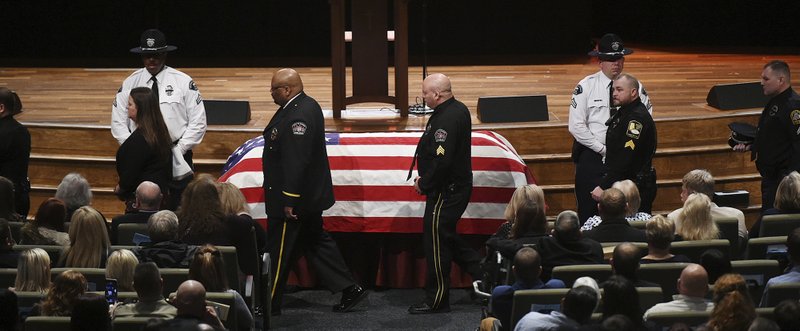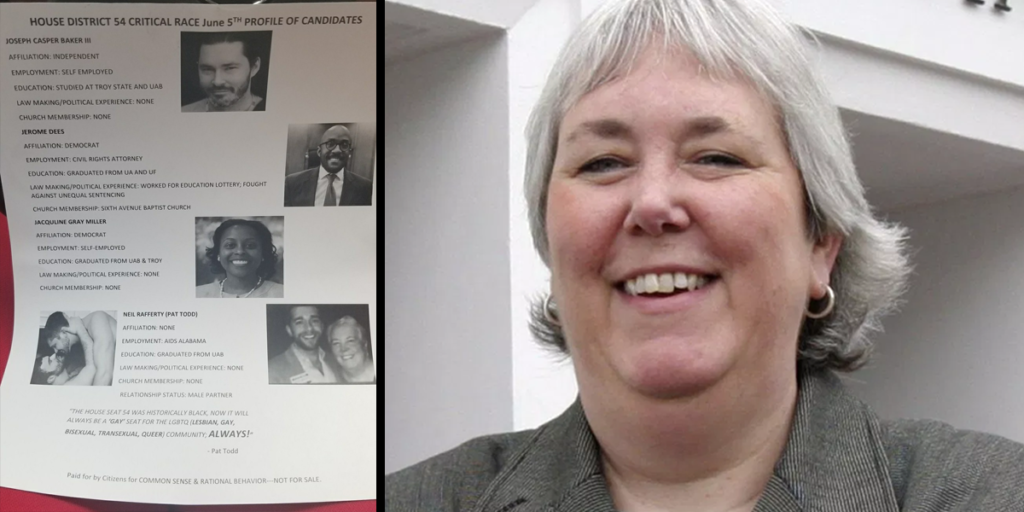Bill to prevent China from buying Alabama real estate passes House

On Tuesday, the Alabama House of Representatives passed legislation that would forbid Chinese citizens, Chinese businesses and corporations, and the Chinese Communist Party and government from being able to purchase land and other real property in the state of Alabama. House Bill 379 (HB379) is sponsored by House Majority Leader Scott Stadthagen. Stadthagen said, “They are the biggest threat to us.” The synopsis states, “Under existing law, an alien, whether resident or nonresident, may own, hold, or dispose of real property with the same rights as a native citizen. This bill would prohibit Chinese citizens, the Chinese government, or Chinese entities from acquiring title to real property in the state.” State Representative Mary Moore said they were not a problem until Ronald Reagan. “When President Reagan started encouraging our companies to go overseas,” Moore said. “That accounts for a lot of poverty, especially in southern Alabama and eastern Alabama because they were clothing manufacturers.” “The problem is bigger than the state of Alabama,” Moore said. “President Reagan loved China, and they became a superpower.” Stadthagen explained that if his bill passes, “They can’t purchase property in Alabama.” Rep. Jamie Kiel said, “Your bill protects the state from the communist Chinese.” “My district was also impacted by the great sucking sound of jobs leaving the country that Ross Perot talked about, and that was under President [Bill] Clinton in 1994 with NAFTA,” Kiel said. “President [Barack] Obama said that the relationship between the U.S. and China was the most important bilateral relationship in the world.” “Whoever started it, it is time to stop it, and I appreciate the bill,” Kiel said. Rep. Tracy Estes said, “For those who may think that the Chinese are not the greatest threat to this country, don’t be fooled.” Rep. Napoleon Bracy asked, “What prompted this?” Stadthagen explained, “In the last year, the Chinese have purchased over six billion dollars’ worth of property.” “This is a protection bill,” Stadthagen said. “I know of several real estate contracts that are in progress.” Bracy asked, “What if they are already here?” “Then they are already here,” Stadthagen answered. “What if they wanted to expand?” Bracy asked. “Then they have to get a citizen or a dual citizen to purchase that property, and they can lease it from them,” Stadthagen answered. Bracy asked, “Could this hurt the economy?” Stadthagen said that it had not in the other states that have done this, but admitted, “This is something that is fairly new.” Stadthagen said, “The Department of Commerce wants to talk to me about it before it goes upstairs to the Senate.” Bracy said that a Chinese corporation had bought piston engine manufacturer Continental Motors. “Continental is in Mobile,” Bracy said. “Are they the enemy? They are providing jobs to our citizens. They are providing over 300 jobs.” “If Continental Motors decides to leave and those 300 jobs and their $75 million investment leaves with them, then we are impacting a lot more people than what this was designed to impact,” Bracy said. Rep. Tim Wadsworth expressed concerns that the way this was written would also apply to Taiwan. “Taiwan is not a part of it,” Stadthagen said. “About 90% of the semiconductor chips in this country are made in Taiwan,” Wadsworth said. “China and the U.S. actually consider Taiwan to be one country as part of the one-China policy.” Rep. Sam Jones said, “Continental Motors was a U.S. Company that sold out to China. They have been in Mobile for over 50 years.” Jones said he had been on several international job recruiting trips as the Mayor of Mobile. “We weren’t recruiting politics – we were recruiting jobs and companies,” Jones said. “Do I support the communism in China? No, I don’t, but we are a world economy.” Stadthagen said, “Do you know how many acres of land are owned by other countries? 1.4 million acres in Alabama are owned by foreign countries.” Jones said, “Alabama exports surged to over $25 billion last year. Our two largest trading partners are Germany and China.” “We don’t handle foreign policy,” Jones said. “That is not what we do here. You don’t know the facts because you have never spent any time recruiting industries.” “We watch Florida and pass everything that they do down there,” Jones said. “I am surprised that we have not passed anything about Mickey Mouse yet. We follow Florida, but we aren’t Florida.” Rep. Neil Rafferty asked about Chinese people that have moved here seeking asylum. “They can lease a house or property while they work on their citizenship,” Stadthagen answered. Rafferty asked, “Why don’t we do this for Vietnam or Laos? They are communist.” “They are not a threat to us,” Stadthagen answered. Rafferty asked, “What other countries would you do this with? “North Korea and Iran,” Stadthagen answered. Rep. John Rogers said, “The federal government is the one who ought to be pulling the trigger on China.” “If China were to stop exporting all the stuff they make for us, we would be in a world of hurt,” Rogers said. “This concerns me because it seems to single out one particular race. I like Chinese food.” Rogers asked, “If China called in our debt, can we pay it?” Stadthagen answered, “We can’t.” Rogers said, “Can you imagine if we had a war with China? We will have to draft you.” Rep. Barbara Drummond said, “I am here standing for Mobile. Brookley is in my district, so I have seen this business grow. I have seen Brookley take off. They are contributing to our local economy. They are contributing to the Alabama economy. I know China is a communist country, and I know how they treat women, and I don’t like that.” Drummond said, “Our Chamber has red-flagged this for us and said that this is going to hurt.” Rep. Ben Robbins offered an amendment addressing members’ concerns. The amendment exempted companies already operating in the state and Taiwan from the legislation. Stadthagen accepted the amendment as friendly, and it was adopted in a 100 to 0 vote. SB379 passed the House in a
Legislature does not appear to be poised to address gambling

The Alabama Legislature met for two days this week for an organizational session in which they elected leadership, appointed committee chairs, and approved updates to the rules for the next four years. The regular session begins on March 7, 2023. One issue that could come up is gambling. The Alabama Supreme Court has emphatically ruled that bingo is a game played on paper cards and that electronic bingo is illegal under the Alabama Constitution of 1901. The court has ordered three electronic bingo facilities in Macon and Lowndes County close. Alabama Attorney General Steve Marshall appealed to the Supreme Court after the lower court denied the AG’s motion. “What he and what the Supreme Court is doing is disenfranchising the voters of those counties,” Senate Minority Leader Bobby Singleton told Alabama Today. Singleton contends that when voters passed county-specific constitutional amendments allowing bingo to be played there, they knew that bingo meant electronic bingo and that the court is interpreting the law wrong. “To say that electronic bingo does not mean bingo is just wrong,” Singleton said. Alabama Today asked if Victoryland, Whitehall, and Greenetrack are closed by the time the session begins, would that encourage the Legislature to pass a gambling bill legalizing some mix of the currently operating casinos. “I would think it would, but I just don’t know,” Singleton said. “I don’t know,” said State Rep. Neil Rafferty when asked if the Legislature would address gambling. “It’s going to take a lot of collective effort to get anything done like that.” Senate Republicans hold a 27 to 8 supermajority in the Alabama Senate, and House Republicans hold a 77 to 28 supermajority in the Alabama House of Representatives, so any gambling would have to have considerable Republican support. “Some people might think there shouldn’t be any gambling in Alabama,” Singleton said. For a gambling constitutional amendment to pass, it would need at least a three-fifths supermajority in favor to pass in both Houses of the Legislature because it takes a constitutional amendment. “It will come up,” Rafferty predicted for the regular session but did not know whether it could possibly pass. Singleton was asked about the top goals of the legislative minority. “Medicaid, Medicaid, Medicaid,” Singleton stated. Singleton acknowledged that Republicans were reluctant to take up the issue last year. “I think that was before the election,” Singleton said. Singleton expressed optimism that a deal on Medicaid expansion can be negotiated with Alabama Governor Kay Ivey and the Republican leadership. Singleton was asked about ending the sales tax on groceries. “What’s going to replace it?” Singleton said, referring to the $500 million in lost revenues. “The federal government has put $60 billion into this state,” Singleton said. “There could be some lean times when that is no longer there. We need to be building up some reserves.” Singleton said that he believes that the Legislature could pass his needle exchange bill to provide free intravenous needles to IV drug users. “I believe the timing is right, right now,” Singleton said. “We talk about fentanyl and all the different drugs out there. This is the time to do with it to be able to aid and help with our drug problem.” To connect with the author of this story, or to comment, email brandonmreporter@gmail.com.
Alabama Cannabis Coalition announces endorsements for November 8 election

The Alabama Cannabis Coalition (ACC) announced that they were endorsing Libertarian nominee Dr. James “Jimmy” Blake for Governor. The ACC endorsed most of the Libertarian Party of Alabama slate of candidates as well as a few Democratic candidates in the November 8 general election. “He supports the Citizen’s right to home grow, the expungement of cannabis convictions, decriminalization, and the “Legalization” of cannabis in the State of Alabama,” said ACC President Marty Schelper. “These are all indicators of a candidate who supports smaller government, freedom, liberty, and justice, for the citizens of the State of Alabama.” “We are proud to give him our overwhelming endorsement and support,” Schelper continued. “The ACC will be campaigning for his election.” On Tuesday, the ACC announced that they had endorsed the candidates for the 2022 Midterm Election. “We are pleased to endorse these Anti Prohibition/ProCannabis Candidates in the State of Alabama. We wholeheartedly endorse their campaigns and believe each candidate to be a breath of fresh air for the necessary change that we need in Alabama regarding Cannabis,” the announcement stated. · Jimmy Blake (L), Governor of Alabama · Ruth Page-Nelson (L), Lt. Governor of Alabama · John Sophocleus (L), US Senate · Alexander M. Remrey (L) US Congress, District 1 · Jonathan Realz (L), US Congress District 2 · Johnny C. Cochran (L), US Congress, District 4 · PJ Greer (L), US Congress, District 5 · Gavin Goodman (L), US Congress District 7th · Leigh LaChine (L), AL State Auditor Alabama State Senate · Rick Chandler (L), Alabama State Senate District 3 · Kyle Richard Garrison (L), Alabama State Senate District 6 · Danny Wilson (L), Alabama State Senate District 19 · Portia Shepherd (L), Alabama State Senate District 23 · Richard Benderson (L), Alabama State Senate District 24 · Louie Albert Albright (L), Alabama State Senate, District 25 · David Boatwright (L), Alabama State Senate District 28 · Floyd “Pete” McBroom (L), Alabama State Senate District 29 · Clifton Hudson (L), Alabama State Senate District 35 Alabama House · Rep. Angela Walser (L), Alabama House Rep. District 8 · Gregory Bodine (L), Alabama House Rep. District 9 · Elijah Boyd (L), Alabama House Rep. District 10 · Talia Shimp (L), Alabama House Rep. District 18 · Matthew G. Morris Jr. (L), Alabama House Rep. District 41 · Doug Ward (L), Alabama House Rep. District 42 · Jason Burr (L), Alabama House Rep. District 43 · Kari Mitchell Whitaker (L), Alabama House Rep. District 45 · Neil Rafferty (D), Alabama House Rep. District 54 · Carson Lester (L), Alabama House Rep. District 56 · Manijeh Nancy Jones (L), Alabama House Rep. District 57 · JP French (L), Alabama House Rep. District 60 · Jeff May (L), Alabama House Rep. District 64 · Scott Manges (L), Alabama House Rep. District 76 · Amanda Frison (L), Alabama House Rep. District 79 · Justin Tyler May (L), Alabama House Rep. District 88 · Margaret “Maggie” Helveston (L), Alabama House Rep., District 94 · Richard Brackner (D), Alabama House Rep. District 95 · Mark Lewis (L), Alabama House Rep. District 105 LOCAL CANDIDATES · Devin Cordell (L), Jefferson County Commissioner, District 3 · Frank Dillman Sr. (L), Macon County Commissioner, District 4 · Charles Wyckoff (L), Mobile County Sheriff The general election is on November 8. To connect with the author of this story, or to comment, email brandonmreporter@gmail.com.
Trans youth medication ban passed by Alabama lawmakers

Alabama lawmakers approved sweeping legislation Thursday to outlaw gender-affirming medications for transgender kids and advanced a separate measure prohibiting early classroom instruction on sexual and gender identity, a bill critics have dubbed “Don’t Say Gay.” The Alabama House of Representatives voted 66-28 for legislation to make it a felony, punishable by up to 10 years in prison, for a doctor to prescribe puberty blockers or hormones or perform surgery to aid in the gender transition of people under age 19. The bill now goes to Republican Gov. Kay Ivey for her signature as Alabama becomes the latest red state to promote legislation and policies aimed at trans youth. Ivey has not indicated whether she will sign it. The topic of transgender and LGBTQ identity has become one of the GOP’s “wedge” issues aimed at securing votes because they are popular with the party’s base. Rep. Neil Rafferty, the only openly gay member of the Alabama Legislature, appeared to struggle to hold back his anger and maintain composure as lawmakers headed to the vote. “This is wrong,” Rafferty said. “Y’all sit there and campaign on family being the foundation of our nation … but what this bill is doing is totally undermining that. It’s totally undermining family rights, health rights, and access to health care.” Republican Rep. Wes Allen of Troy, sponsor of the House version of the bill, argued during debate Thursday morning that transgender youth are not old enough to make decisions about gender-affirming medication. “Their brains are not developed to make the decisions long term about what these medications and surgeries do to their body,” Allen said. Rep. Chris England, who serves as chairman of the Alabama Democratic Party, said the measure targets already vulnerable children and essentially tells them they are not welcome in Alabama. “You’re saying this is about children. It’s not. What it is about is scoring political points and using those children as collateral damage,” England said. The bill would also require school counselors, nurses, and others to tell parents if a child discloses they believe they are transgender. A spokeswoman for Ivey did not immediately reply to a text message asking if the governor will sign the measure. “I want the governor to know that she doesn’t have to sign this, she can veto it,” Jeff Walker, whose 15-year-old daughter, Harleigh, is transgender, said Thursday afternoon. “All you are doing is hurting Alabama families with these bills.” Arkansas approved a similar law in 2021, but it was put on hold by the courts. Advocacy groups in Alabama have vowed to quickly challenge the measure if Ivey signs it into law. In a written statement, Chase Strangio, deputy director for Trans Justice with the ACLU’s LGBTQ & HIV Project, called the Alabama measure “the most deadly, sweeping, and hostile law targeting transgender people in the country.” White House spokeswoman Jen Psaki told reporters Thursday that the U.S. Department of Justice has warned states such laws and policies may violate the Constitution and federal law. “Today’s vote in Alabama will only serve to harm kids,” she said. The Alabama Senate advanced separate legislation Thursday related to public school bathrooms and discussions of gender and sexual identity in early grades. Senators voted 26-5 to approve legislation mandating that K-12 students can only use multiperson bathrooms and locker rooms that correspond with the gender on their original birth certificate, rather than their current gender identity. Republicans in the Senate also added language similar to a law in Florida that critics called the “Don’t Say Gay” measure. The Alabama language would “prohibit classroom instruction or discussion on sexual orientation or gender identity” for students in kindergarten through the fifth grade. The Alabama proposal goes further than Florida’s law, which includes grades K-3. Republished with the permission of the Associated Press.
Alabama House committee advances lottery bill

An Alabama legislative committee advanced a lottery proposal Thursday as proponents try to get the issue before voters for the first time since 1999. The House Tourism and Economic Development Committee approved the proposed constitutional amendment and related enabling legislation. The bills now move to the full House of Representatives. Alabama is one of five states without a state lottery. Republican Rep. Chip Brown, the bill’s sponsor, said it is the top issue he and other lawmakers get asked about in their districts. He said many Alabamians now drive across state lines to buy tickets. “The people of Alabama have been playing the lottery for years. We’ve just been playing it in other states. So it’s time we kept that money in-state and helped out the children of the state of Alabama,” Brown told reporters. The measure faces a short window to win final approval with just seven meeting days remaining in the legislative session. Brown said he hoped for a vote in the final week of March when lawmakers return from spring break. House Speaker Mac McCutcheon said he first wants assurances that supporters have the needed 63 votes for passage before bogging down one of the final legislative days with the lengthy debate. He asked members to spend spring break talking with constituents and colleagues to determine the level of support. “We’ve got to see where the votes are,” McCutcheon said. Lottery proceeds would be used primarily to provide scholarships to help families pay a portion of tuition at two and four-year colleges. The two-year scholarships would be capped at $2,500 or less. The amount of the four-year scholarships would be determined based on lottery proceeds and the number of eligible recipients. The Legislative Services Agency estimated a lottery would generate $198 million to $285 million annually after paying prizes and expenses. Rep. Neil Rafferty, a Democrat from Birmingham, told Brown he wanted to make sure low-income families are receiving an equitable share of the benefits from lottery proceeds. “It is usually not wealthy people that are participating in the lottery. If we are going to do the lottery, we ought to do it right, and I would want equity in that,” Rafferty said. The committee approval came after a brief public hearing in which two opponents spoke against the proposal. Joe Godfrey, executive director of the Alabama Citizens Action Program, told the committee lottery benefits will be fueled by tickets bought by low-income Alabamians. “Wealthy people don’t buy lottery tickets. This is coming out of the pockets of the poor,” Godfrey said. If approved by three-fifths of lawmakers, the lottery proposal would go before voters in November. The House lottery bill advanced as a separate proposal that would allow a lottery and eight casinos with table games has so far stalled in the Alabama Senate amid longstanding divisions over which sites and entities would hold the casino licenses. Alabama is just one of five states — along with Nevada, Utah, Alaska, and Hawaii — without a state lottery. State voters in 1999 rejected a lottery proposed by then-Gov. Don Siegelman. Since then, efforts to create a state lottery or allow casinos have failed under a fatal mix of conservative opposition to legalized gambling and turf wars over who could operate lucrative electronic gambling machines. “We’ve been talking about this ever since 1999. It’s time for the citizens of this state to decide whether they want a lottery or not,” Rep. Berry Forte, a Democrat from Eufaula, said during the committee debate. Republished with the permission of the Associated Press.
House approves ‘born alive’ abortion bill

Doctors could face prison sentences if they fail to try to save babies “born alive” after an attempted abortion, under a bill approved Thursday night by the Alabama House of Representatives. Lawmakers voted 76-12 for the bill by Republican Rep. Ginny Shaver of Leesburg. It now moves to the Alabama Senate. Shaver argued the law was needed to protect babies while opponents of the bill said the legislation was unneeded because what Shaver was describing is already illegal. “Laws already exist to protect children from the moment they are born and exit the womb and there’s absolutely no loophole that would allow infanticide without severe criminal penalty,” said Rep. Neil Rafferty, D-Birmingham. Shaver, who worked at a crisis pregnancy center, said she heard of a case where a doctor did not aid a baby that was living after an abortion attempt. Democrats pressed for details, but Shaver said she could not disclose them for privacy reasons. “This is not about abortion. This is about a baby’s right to life,” Shaver said. Alabama doesn’t allow abortions at or after 22 weeks of pregnancy as measured by the woman’s last menstrual period. According to the American College of Obstetricians and Gynecologists, babies born before 23 weeks of pregnancy usually do not survive with very rare exceptions. Republished with the permission of the Associated Press.
House votes to make it a hate crime to target police

The bill found broad support in both parties in the House.
New marriage forms and process starts week

Alabama will require new forms— and a new process — for getting married beginning next week. The Alabama Department of Public Health issued guidance Tuesday about the new form and procedure. The Alabama Legislature this year voted to do away with marriage licenses to accommodate conservative probate judges who objected to same-sex marriage. Instead of a marriage license, couples will fill out a new form , have it notarized and then take it to the probate judge within 30 days. A wedding ceremony is no longer required, but a couple can still have one if they choose. The couple’s marriage date is the date that the affidavit on the Alabama Marriage Certificate form is signed by the two spouses, provided the notarized form is returned to the probate office within the required time frame. The change begins Friday, August, 29th. Ever since same-sex marriage became legal in Alabama, a few of the state’s 68 probate judges had refused to issue marriage licenses to anyone so they didn’t have to give them to gay couples. Alabama law says probate judges “may” issue marriage, but doesn’t force them to do so. Republican Sen. Greg Albritton proposed the change in state law. He said he believes it should accommodate probate judges’ concerns and allow people to get marriage documents everywhere. “There are many areas that are not conducting any marriages at all in the state. That puts a burden on those residents to travel somewhere else,” Albritton said. “I think it is going to allow all of Alabama to engage in matrimony. I think that is a very good thing,” Albritton said. Albritton pushed the change for several years before it was approved this legislative session. When the Alabama House of Representatives approved the change in May, Rep. Neil Rafferty, the only openly gay member of the House, said the change was “born out of prejudice.” “It accommodates a handful of judges that couldn’t get their personal feelings, couldn’t check those at the door and couldn’t do their jobs,” Rafferty, Democrat-Birmingham, told reporters in May. Republished with the permission of the Associated Press.
Bill to get the state out of the marriage business heads to Kay Ivey

After some conservative Alabama probate judges stopped issuing marriage licenses over the issue of same-sex marriage, state lawmakers have come up with a workaround: marriage certificates that don’t have to be signed before the wedding by the judge. The bill, which won final approval Thursday, now goes to Gov. Kay Ivey for her signature. For several years a few conservative probate judges in Alabama have refused to issue marriage licenses to anyone so they don’t have to issue them to gay and lesbian couples. The House of Representatives voted 67-26 for the bill that would replace marriage licenses with a new form called a marriage certificate. Republican Sen. Greg Albritton, the sponsor of the bill, said he proposed the change so people can obtain marriage documents in every county. Rep. Neil Rafferty, the only openly gay member of the House, said the proposal was “born out of prejudice.” “It accommodates a handful of judges that couldn’t get their personal feelings, couldn’t check them those at the door and couldn’t do their jobs,” Rafferty, Democrat-Birmingham, said. Current Alabama law says probate judges “may” issue marriage, but doesn’t force them to do so. After same-sex couples obtained the legal right to marry, about a half dozen of Alabama’s 68 probate judges declined to issue licenses so they would not have to give them to gay couples. Rep. Wes Allen, a Republican from Pike County, was one of the judges who made that decision. “I believe marriage is between a man and a woman, as do a lot of Alabamians,” Allen said. Allen said he received “overwhelming” support in the county for his decision. Currently a judge signs a marriage license before a couple’s wedding. Allen said he viewed signing the form as endorsing the marriage. Under the proposed change, couples would return a form and an affidavit affirming they meet legal requirements to be married, to the probate judge’s office. The judge, or someone in his or her office, would still sign the certificate to show it was filed with the county. Albritton said that is acceptable to the judges because it is simply signing off on the documents being filed. Albritton argued the proposal would not be much change for couples.“I’m glad it’s done. This helps everybody in the state,” Albritton said. Republished with permission of the Associated Press.
Race to replace Patricia Todd takes negative turn

With the June primary election less than two weeks away, the campaign for the House District 54, to replace outgoing state Rep. Patricia Todd, is getting aggressive — with negative, hateful fliers being distributed to households throughout the District. Up until this point, the highly contested race in the downtown Birmingham district — between Independent Joseph Casper Baker III, and Democratic candidates civil rights lawyer and Alabama Young Democrats Chairman Jerome Dees, Birmingham environmentalist Jacqueline Gray Miller and Neil Rafferty, Director of Birmingham AIDS Outreach — has remained relatively civil. But all of that changed on Thursday when news broke in the “I Believe in Birmingham” Facebook group that a negative flier was being distributed to households in the district. With photos and bios of the four candidates, the flier was a smear tactic against Neil Rafferty. It read: The House Seat 54 was historically black, now it will always be a “gay” seat for the lGBTQ (Lesbian, Gay, Bisexual, Transexual, Queer) community; Always! – Pat Todd Paid for by Citizens for COMMON SENSE & RATIONAL BEHAVIOR — NOT FOR SALE. An hour later, candidate Baker caught Kamau Afrika, the several times failed candidate for mayor, in the act of distributing the fliers. Shortly after that he posted, “Unfortunately I must confirm that Kamau was paid by the Dees campaign to canvas.” Turns out Baker was right. Afrika was in fact paid by the Dees campaign to canvas on his behalf. According to Dees’ campaign finance disclosure forms, he paid Afrika $3,500 on May 18. But Dees himself denies granting Afrika permission to distribute the literature, which he says is “disgusting, disappointing, and contrary to everything I stand for and have worked for.” He took to Facebook to address the issue: It has come to my attention that an individual hired to work on my campaign has distributed literature that is homophobic in nature, directed at Neil Rafferty, another candidate in the race for House District 54 whom I have come to know and respect. This literature is disgusting, disappointing, and contrary to everything I stand for and have worked for. I did not approve or condone this, and I am heartbroken that it was done by an individual working on my behalf. I have terminated his services effective immediately, and I offer my most sincere apology to Neil and to other members of the LGBTQ+ community, on whose behalf I have worked tirelessly for years. In love and solidarity, Jerome It appears the quote from Todd on the flier was made up by Afrika. Todd has not responded to Alabama Today for comment to clarify.

